Food is not merely sustenance, but a complex symbol of cultural heritage, social relationships, and personal identity. It carries meanings that go beyond the nutritional and physical, enveloping a richness that spans cultural attitudes, practices, and beliefs. Cultural attitudes towards food and their associated eating behaviors are influenced by a tapestry of factors including tradition, social norms, and historical context. These cultural underpinnings shape not only what individuals choose to eat but also how and why certain foods are selected, procured, and consumed within and across different societies.
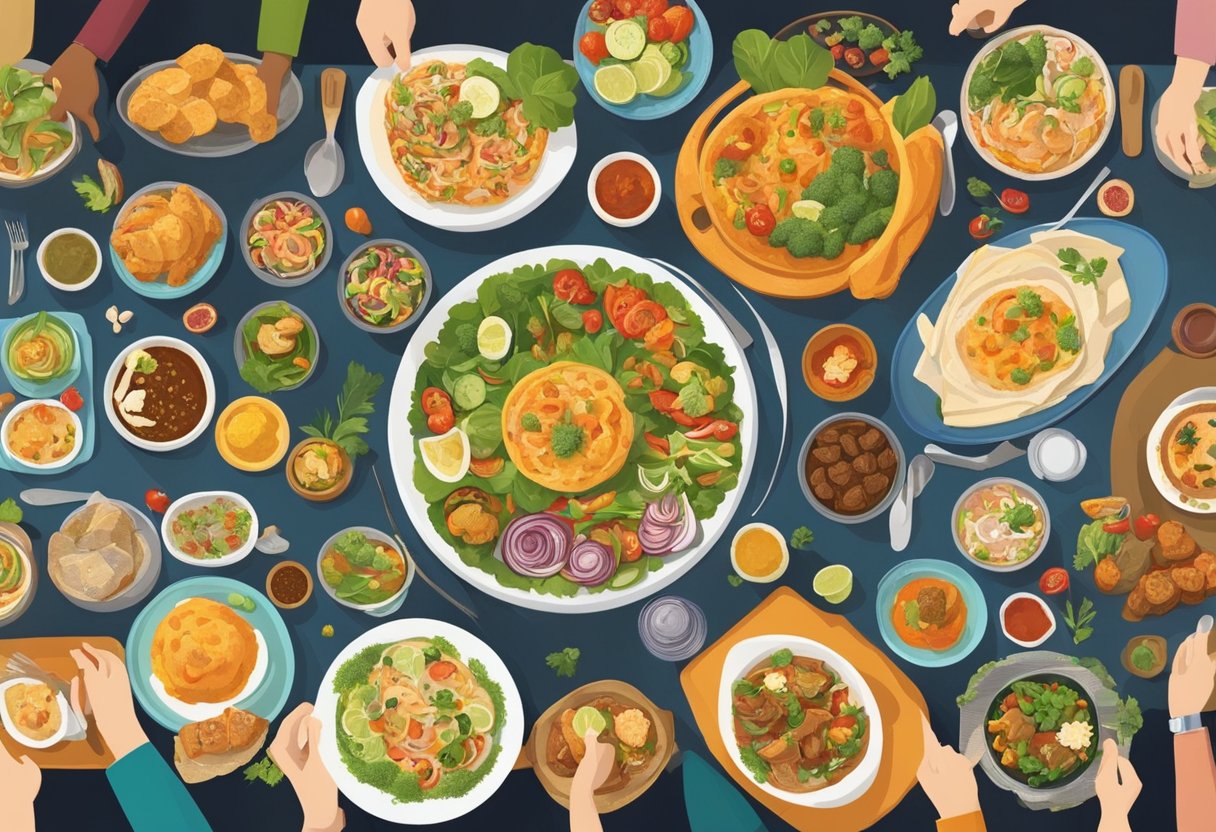
On a granular level, every culture imparts its own set of values and norms surrounding food, which in turn inform a wider discourse on health, nutrition, and wellbeing. The Mediterranean diet, for instance, is not simply a collection of foods such as olive oil, fish, and whole grains, but also embodies a historical synergy between the environment, local production, and community-based eating practices. These patterns are not static but are constantly evolving with external influences and internal innovations, reflecting the dynamic interplay between tradition and modernity. Understanding cultural food attitudes is thus critical in assessing the collective behaviors that inform food policy, education, and community engagement.
Key Takeaways
- Cultural food practices influence not just diets but reflect broader social and historical narratives.
- Dietary habits are shaped by a combination of tradition, environmental accessibility, and social dynamics.
- Discussion around food and nutrition is integral to community health and informed by cross-cultural perspectives.
Table of Contents
The Role of Culture in Shaping Dietary Habits

Culture significantly influences what, how, and why people eat. These eating patterns are deeply rooted in the traditions, economic conditions, and religious practices of each society.
Understanding Food Choices Across Different Cultures
Dietary habits are often passed down through generations, and food culture is integral to cultural identity. For instance, India is known for its vegetarian cuisine closely tied to religious and ethical beliefs, while Mexico features a rich tradition of corn-based dishes like tacos and tamales. In both countries, these food choices and preferences reflect the historical, agricultural, and social circumstances that shaped their respective food systems.
Influence of Religion and Tradition on Food and Nutrition
Religion plays a pivotal role in dietary choices, often dictating food selection and promoting traditional foods. For example, certain Hindu communities in India abide by strict vegetarian diets due to the reverence for life in all forms. Similarly, dietary laws in Islam and Judaism ban the consumption of specific foods, significantly shaping the food culture within these communities.
Economic and Sociodemographic Impact on Food Consumption
Income, sociodemographic factors, and social class noticeably affect food consumption patterns. In the United States, higher-income groups may have better access to a variety of foods, including those aligning with a gluten-free Mediterranean diet, known for its emphasis on fruits, vegetables, and whole grains. Conversely, lower-income populations may prioritize affordability, impacting their nutritional choices.
Globalization and Its Effect on Local Food Systems
The advent of globalization has intensified the interchange of food products and dietary practices worldwide, leading to a nutrition transition. This shift often results in the adoption of Western dietary patterns, impacting local food cultures and possibly leading to a homogenization of food preferences. Yet, this phenomenon also allows for the incorporation of global health-conscious trends such as the gluten-free Mediterranean diet into different cultural food practices.
Food, Health, and Nutrition: A Multifaceted Connection
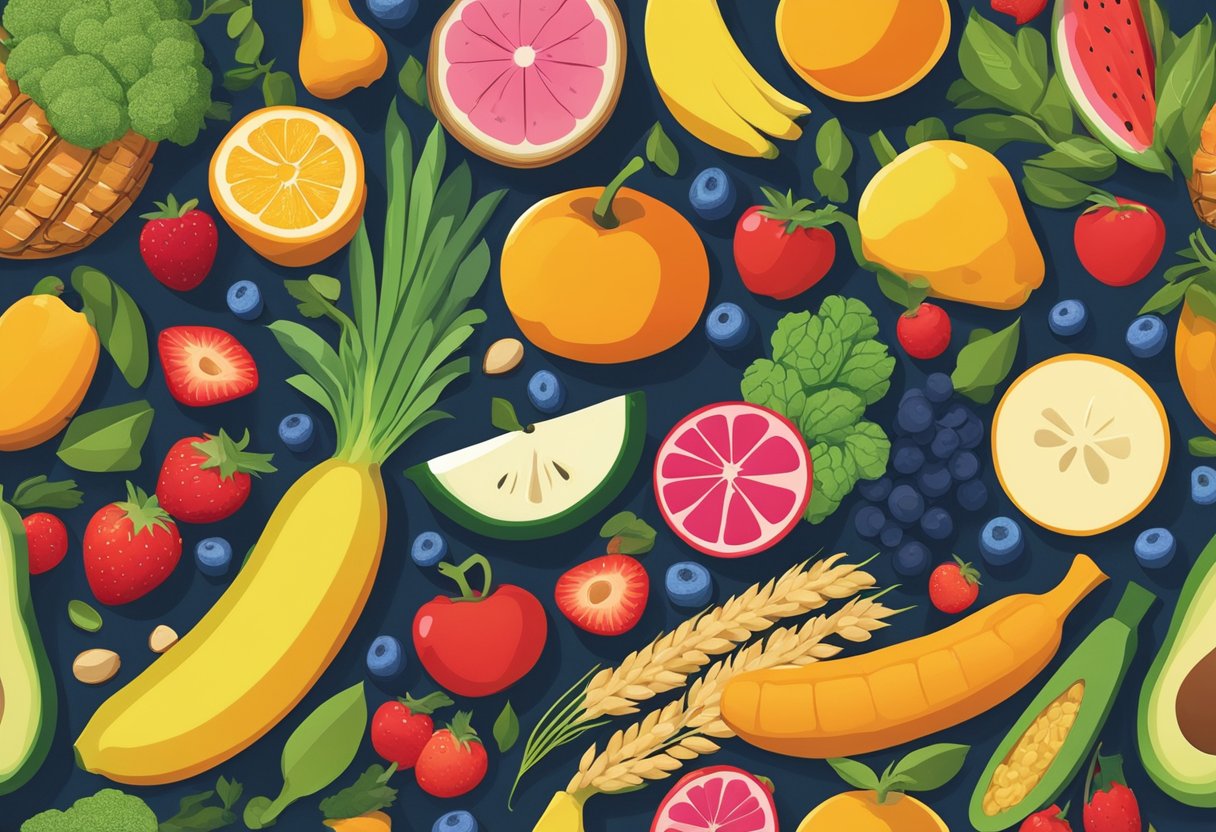
The interplay between diet and health extends beyond basic nutrition, touching on psychological, familial, and educational aspects. This section explores the complex relationship between what we eat, the societal factors that influence those choices, and their cumulative impact on our health and well-being.
Public Health Perspectives on Diet and Chronic Diseases
Public health initiatives have underscored the connection between food consumption and non-communicable diseases such as type 2 diabetes and obesity. The Mediterranean diet, recognized for its rich composition in fruits, vegetables, whole grains, and lean proteins—especially when adapted to be gluten-free—offers a framework for preventing chronic illnesses. By emphasizing moderation and a variety of key food groups, individuals can lower their risk and improve their overall health.
The Psychological Impact of Food on Body Image and Well-Being
Food plays a significant role in shaping one’s self-esteem and body image. A gluten-free Mediterranean diet, aside from catering to those with gluten sensitivities, often aligns with what is considered the “thin ideal” in many societies. While beneficial from a nutritional standpoint, the diet’s social reception may also influence psychological well-being positively, reducing the risk of eating disorders prevalent in adolescents chasing unhealthy body standards.
Family and Educational Influences on Childhood Eating Habits
Education and family environments are catalysts for instilling healthy diet habits in children. With the rise of childhood obesity, awareness and structured education about the benefits of a balanced, gluten-free Mediterranean diet are essential in fostering proper child nutrition. Encouraging families to adopt this dietary pattern can contribute to healthier food preferences and eating practices that carry on through adolescence and into adult life.
Environmental Factors in Food Availability and Selection
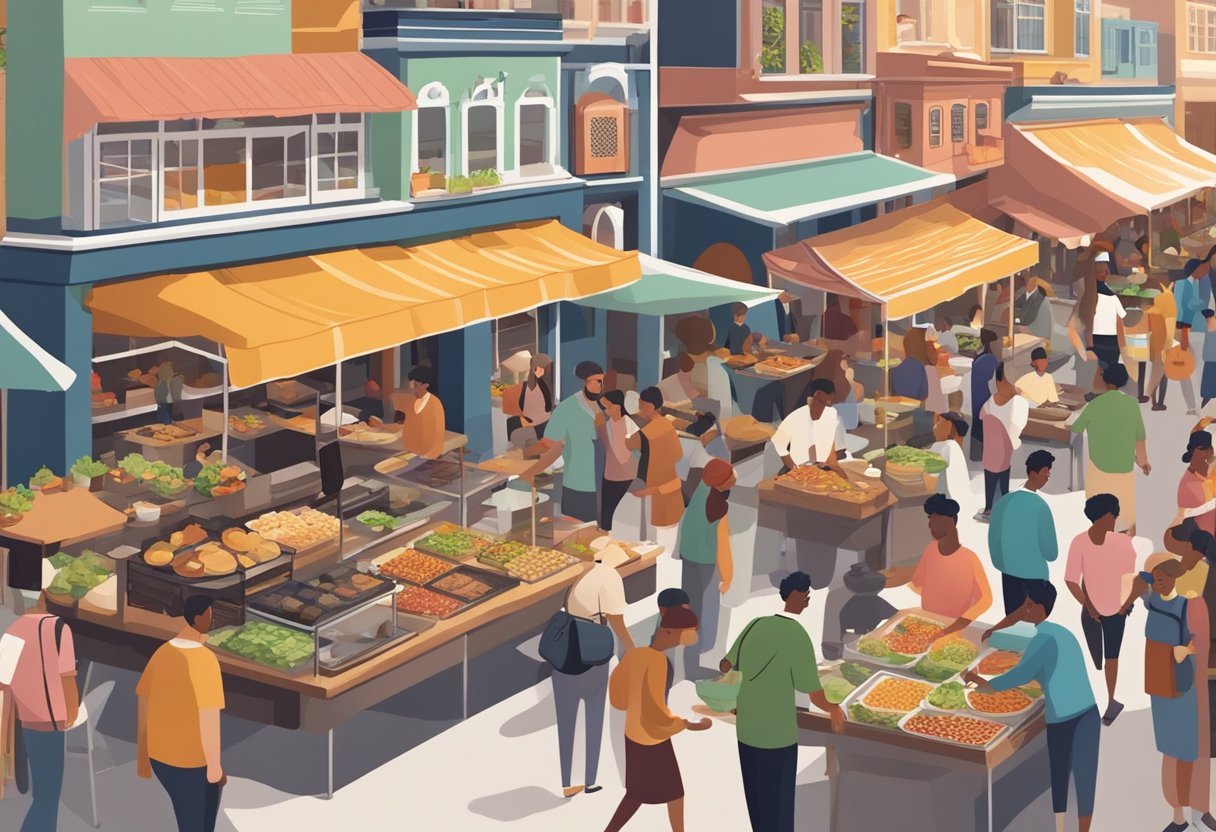
The availability and selection of food are critically influenced by environmental factors, which determine what food options are accessible to different populations. These factors play a significant role in shaping the dietary choices individuals make, particularly in relation to sustainability practices and the balance between convenience and nutritional quality.
Sustainability and Ecology of Food Production
Sustainability in food production hinges on environmentally friendly agriculture practices that maintain ecological balance. For a gluten-free Mediterranean diet, the focus is on diverse crops that are native to the Mediterranean basin, which tend to require less water and are well-adapted to the local climate. Responsible farming methods, such as crop rotations and integrated pest management, enhance soil fertility and reduce the need for chemical pesticides, which supports the long-term sustainability of food availability.
The Urbanization Paradox: Convenience vs. Nutritional Quality
Urbanization has led to a surge in fast food and convenience stores, which often lack nutritional options, favoring processed foods over whole foods. Although these outlets provide easy access to food, they frequently offer items that are incompatible with a healthy diet, including those adhering to a gluten-free Mediterranean diet. The proliferation of convenience food options results in a paradox where urban dwellers, despite living in close proximity to diverse food outlets, may struggle to find fresh, wholesome ingredients essential for a sustainable diet.
Access to Healthy Options: Income and Geographic Disparity
Income and place significantly influence one’s access to a healthy diet. There is a stark contrast in food availability between different socioeconomic areas, with higher-income regions often having a better supply of fresh produce and gluten-free products essential for a Mediterranean diet. Conversely, lower-income neighborhoods tend to have limited access to these healthy options but an abundance of junk food and fast food. Moreover, people living in rural or isolated areas may face challenges in sourcing a diverse range of ingredients due to the affordability and availability of such items.
Social Dynamics and Eating: From Individual Choices to Collective Behaviors
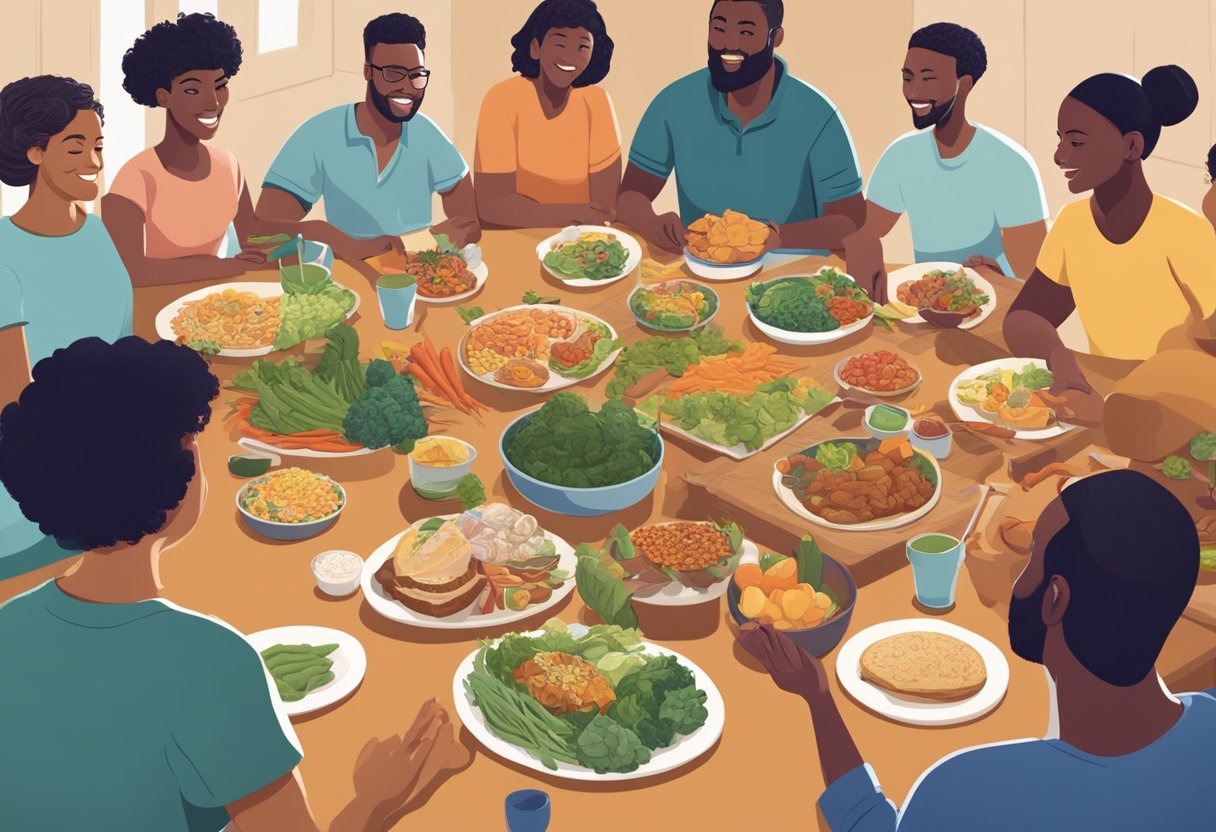
Eating behaviors reflect a complex interplay between individual predilections and the broader social framework in which they exist. Cultural and social forces significantly shape dietary habits, nudging individuals towards collective norms.
The Social Construction of Taste and Dietary Preferences
Taste is not simply a matter of individual biology, but significantly constructed through social interactions. In Mediterranean societies, for instance, a preference for gluten-free options may arise not only from health concerns but also from collective attitudes towards food quality and well-being. Shared values within a family or community encourage dietary patterns that align with cultural identity, where gluten-free choices can be seen as aligning with the high-quality, plant-based elements of the Mediterranean diet.
Age, Sex, and Ethnic Variations in Eating Practices
Dietary habits are often delineated by age, sex, and ethnicity, reflecting the diverse needs and cultural practices of different groups. Mediterranean youth, for example, may adopt gluten-free eating patterns due to increased health consciousness or as a means of social expression. Men and women may showcase variations in embracing a gluten-free lifestyle, potentially influenced by gendered beliefs about health and body image. Further, ethnic groups within Mediterranean regions might blend traditional culinary practices with contemporary trends, creating unique, culturally specific gluten-free dishes.
Social Influence and Control in Sharing Food-Related Values
Families and social networks exert a strong social influence on members’ food choices. Through shared meals and culinary traditions, cultural and family values are passed down and reinforced. A Mediterranean family’s collective decision to adopt gluten-free foods could be driven by broad cultural dimensions of health promotion and disease prevention. Additionally, social control mechanisms, such as approval for adhering to healthy eating patterns, strengthen conformity to established dietary preferences and values within a community.
Historical and Contemporary Perspectives on Food Practices
This section examines how food practices have evolved over time, reflecting changes in cultural dimensions, nutritional science, and global food systems.
Nutrition Transition and Changing Food Landscapes
The term nutrition transition refers to the global shift in dietary patterns and food choices that often correspond with economic development, urbanization, and increased income. Historically, societies largely consumed local, traditional diets consisting of grains, fruits, vegetables, and small amounts of meat. Today, a Mediterranean diet, especially one that is gluten-free, showcases a contemporary return to these roots with its emphasis on olive oil, fish, and fresh produce, which align with both historical eating habits and modern preferences for healthier, culturally rich diets.
The Role of Cultural Dimensions in Modern Food Choices
Cultural factors deeply influence modern food choices. For example, cultural dimensions such as collectivism may affect the communal nature of meals, emphasizing shared dishes that suit a variety of dietary needs including gluten-free options. The Mediterranean diet resonates with many seeking to balance taste and health-conscious eating. It’s a reflection of how contemporary food culture maintains a link to cultural identity, grounded in the belief that traditional practices can coexist with modern dietary concerns.
Identifying Patterns in Sociocultural Food Trends
Sociocultural food trends, when observed over time, can lead to the identification of broader societal changes. Aspects like social factors and cultural identity are often expressed through changing food preferences and taste. A gluten-free diet integrated within a Mediterranean framework not only addresses health concerns but also illustrates a collective preference for what is perceived as authentic, traditional, and beneficial. Observing these trends provides insights into the sociology of food and the intertwined nature of nutrition and culture.
Policy, Education, and Community Engagement in Food-Related Health
In tackling food-related health issues, modern initiatives draw on the symbiotic relationship between policy, education, and community engagement. Strategies are balanced to embrace public health, nutritional understanding, and sustainable practices within these frameworks.
School and Community Programs for Better Nutritional Outcomes
Schools are fundamental in instilling nutritional education early. Programs that integrate a gluten-free Mediterranean diet offer diverse, plant-based options which can be critical to managing health conditions like celiac disease. These programs not only educate students on nutrition but also incorporate sustainability considerations by selecting local, seasonal produce. Community engagement here is dual-faceted, reflecting both in the involvement of family members in health promotion activities and partnerships with local farms.
Government Guidelines and Food Policy Implications
Government guidelines are pivotal, outlining dietary standards that shape the landscape of public health initiatives. Policymakers are increasingly recognizing the value of dietary patterns, such as the gluten-free Mediterranean diet, which promotes heart health and sustainability. These guidelines often translate into public practice, with government-sponsored educational resources and subsidies for healthy food options.
The Importance of Public Participation in Nutritional Advocacy
Nutritional advocacy and public participation are cornerstones for change. Community engagement in public health dialogues ensures policies align with citizen needs, contributing to more effective health promotion. Grassroots movements can pressure governments into adopting more health-conscious policies, particularly in underscoring the importance of widespread education on diets such as the gluten-free Mediterranean diet, which support both health and environmental sustainability.
Frequently Asked Questions
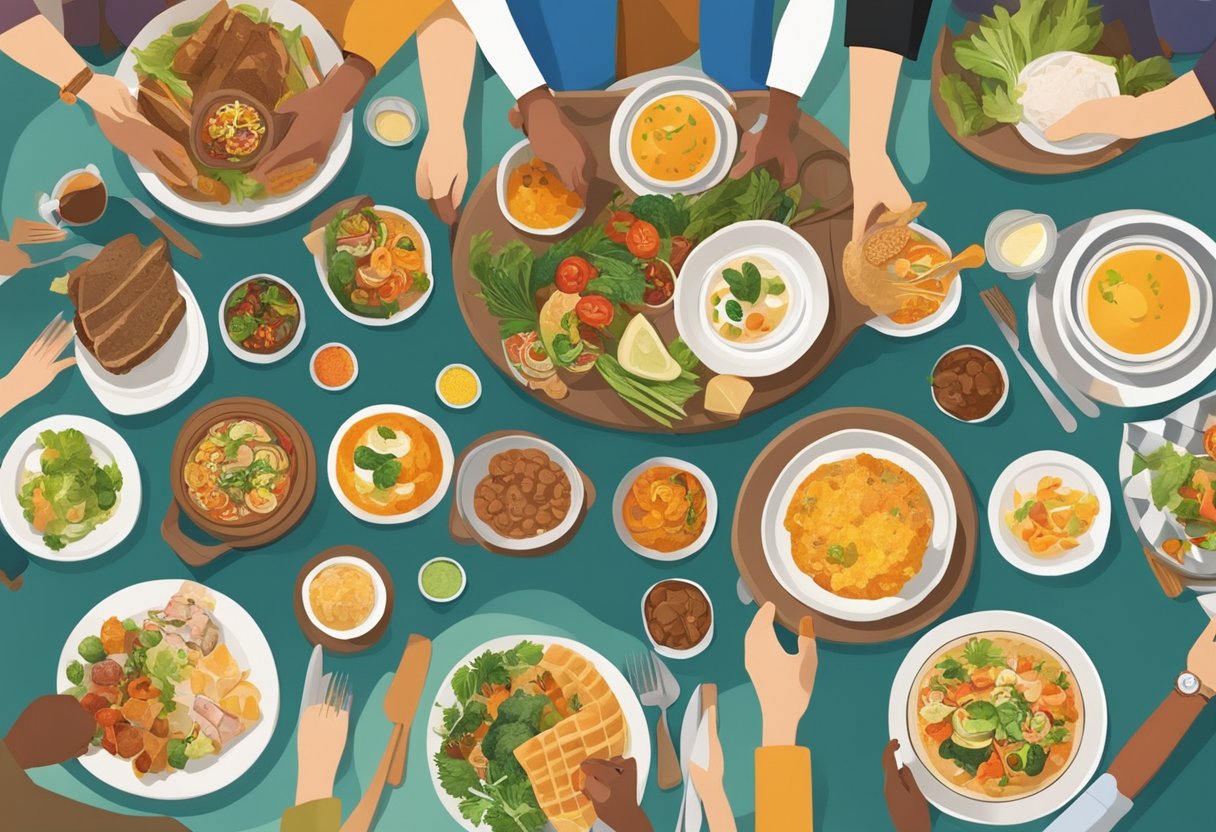
Food is not only a means for survival but also a representation of culture, encompassing history, tradition, and societal values. The following frequently asked questions delve into the intricacies of how food intersects with cultural practices and beliefs.
How do cultural traditions shape dietary habits and preferences?
Cultural traditions often dictate the types of foods that are considered acceptable or desirable within a community, such as the emphasis on plant-based foods and whole grains in a Mediterranean diet. This shaping of palate extends to gluten-free options as well, with many traditional Mediterranean dishes naturally lacking gluten.
In what ways does religion impact food choices and dietary restrictions?
Religious doctrines have a significant impact on diet by setting forth guidelines and restrictions, such as the prohibition of gluten for individuals with celiac disease paralleling religious fasting or abstinence practices. For instance, religions might prescribe specific periods of fasting, which can have analogs in gluten-free diets during times of detoxification.
What role does food play in cultural identity and community cohesion?
Food serves as a cornerstone of cultural identity and can be a source of community cohesion, uniting people through shared culinary experiences. Gluten-free Mediterranean cuisine, for instance, is not just a dietary condition but also part of a cultural tapestry that values health, flavor, and communal dining.
How do societal norms and values influence individual eating behaviors?
Societal norms and values propagate eating behaviors, exemplified by the prevailing health-conscious trends that promote gluten-free diets blended within Mediterranean eating customs. This reflects society’s growing concern for well-being and natural ingredients.
Can you give examples of how regional cuisines reflect historical and cultural development?
Regional cuisines such as the Mediterranean diet reveal much about a culture’s past, including trade routes that introduced new ingredients and methods that yielded gluten-free staples like polenta. These elements are indicative of a people’s adaptation and cultural evolution.
What are the implications of globalization on local food cultures and ethnic diets?
Globalization infuses local food cultures with foreign influences, which can challenge traditional diets and simultaneously offer new gluten-free ingredients for wider adoption within culinary practices, including Mediterranean cuisine. This exchange reshapes and sometimes enriches local food identities.



